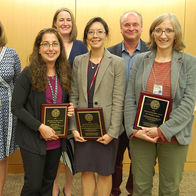Laurie Kilpatrick, PhD
Assistant Dean, Clinical Research
Professor, Microbiology, Immunology & Inflammation
Professor, Center for Inflammation and Lung Research
Professor, Department of Thoracic Medicine and Surgery
Professor, Sol Sherry Thrombosis Research Center

- Contact Information
-
- About Me
-
Research Interests
Dr. Kilpatrick’s research focuses on investigating molecular mechanisms regulating proinflammatory signaling in the innate immune system; particularly the role of activated leukocytes in the development of lung injury. Current work in the laboratory is focused in three areas:
- Regulation of neutrophil-endothelial interaction and control of neutrophil migration to the lung;
- Translational research evaluating the use of anti-Protein Kinase C therapies for the treatment of sepsis-induced acute lung injury: and
- Identification of neutrophil and macrophage phenotypes in acute and chronic lung diseases (ex. sepsis and chronic obstructive pulmonary disease (COPD)) and the role of different immune cell phenotypes in disease pathology.
An important focus of her work is examining the regulation of leukocyte migration into the lung. Using both in vitro and in vivo approaches, she is examining signaling pathways which regulate leukocyte-endothelial interaction and the control of transmigration. Her research group has extensive expertise with different models of inflammation in rodents and in the isolation and analysis of human neutrophils, monocytes and alveolar macrophages. Dr. Kilpatrick identified the Serine/Threonine Kinase, Protein Kinase C-delta (PKCδ) as a critical regulator of the inflammatory response in the lung. Current studies employ a rodent model of sepsis to determine the in vivo effects of genetic and pharmacologic inhibition of PKCδ and in vitro studies examining the role of PKCδ in regulating individual steps in neutrophil migration through inflamed vasculature.
In translational studies, she is studying the use of directed anti-PKCδ therapy to the lung for the treatment of acute lung injury in a rodent model of sepsis. Recently, Dr. Kilpatrick demonstrated that PKCδ inhibition had an anti-inflammatory and lung protective effect indicating that targeting PKCδ may offer a unique therapeutic strategy for preserving pulmonary function in sepsis. Her studies demonstrated that PKCδ inhibition decreased pulmonary endothelial adhesion molecule expression, attenuated neutrophil influx into the lung and improved gas exchange in sepsis-induced lung injury. A critical issue in the development of anti-inflammatory therapeutics is the risk of immune suppression and inability to effectively clear pathogens. Current studies are investigating whether PKCδ inhibition could provide lung protection without compromising pathogen clearance, attenuate sepsis-induced multiple organ failure and improve survival.
Dr. Kilpatrick is also interested in the identification of neutrophil and macrophage phenotypes in acute and chronic lung diseases (ex. acute respiratory distress syndrome (ARDS) and COPD) and the role of different immune cell phenotypes in disease pathology. In particular, she is interested in the expression of M1 (pro-inflammatory) and M2 (immunomodulatory) macrophage phenotypes in COPD and their impact on inflammatory gene expression and cell death. Current work in this area is focused on the role of macrophage phenotype on ER (endoplasmic reticulum)-stress mediated inflammatory and UPR (Unfolded Protein Response) gene expression, inflammatory cytokine secretion, and whether macrophage heterogeneity modulates UPR-related gene expression or signaling networks.
- Education, Training & Credentials
-
Educational Background
- Postdoctoral Fellowship, Pharmacology, University of Pennsylvania, Philadelphia, PA
- PhD, Biochemistry, University of Pennsylvania, Philadelphia, PA
- BA, Hampshire College, Amherst, MA
Memberships
- American Physiological Society
- Society for Leukocyte Biology
- Shock Society
- Publications
-
Digital Bibliography




